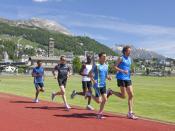There are eight main types of technology that can be adopted within training these areáK
"h High Altitude Training
"h Peaking
"h Qualitative v Quantitative
"h Anaerobic Threshold Training
"h Plyometrics
"h Isokinetic Conditioning
"h Environmental Chambers
"h Heart Rate Monitoring
I will describe each of these technologic developments in training, incorporating the ADVANTAGES and DISADVANTAGES of each method.
High Altitude Training
The main problem with high altitudes is that there is less oxygen in the air. This doesn't pose a threat for pure anaerobic athletes but for endurance or aerobic athletes this could seriously affect performance. Training at high altitude has many benefits. The first thing that happens is your respiratory rate and heart rates speed up. This occurs both at rest and during sub-maximal exercise. This helps offset the lower partial pressure of oxygen. The long-term changes that take place during high altitude training are a decrease in maximum cardiac output, a decreased maximum heart rate,
an increased number of red blood cells, excretion of base via the kidneys to restore acid-base balance.
(Unfortunately, the net result is that you have less tolerance for lactic acid.), a chemical change within red blood cells that makes them more efficient at unloading oxygen to the tissues, an increase in the number of mitochondria and oxidative enzymes. All these changes come together to overall improve the efficiency of the athlete's respiratory system.
There are some practical implications suffered by high altitude training these are
Diet - A high carbohydrate, low salt diet allows for better adaptation and less risk of "mountain sickness". Some people experience significant decline in appetite and the resulting loss of muscle mass may hinder performance.
Iron is used to make haemoglobin and the demand for making more red blood cells may require iron supplementation -- especially in...


